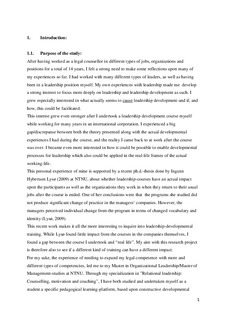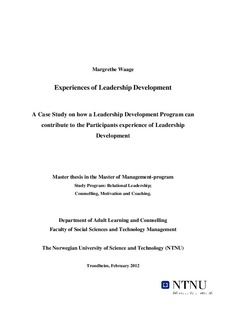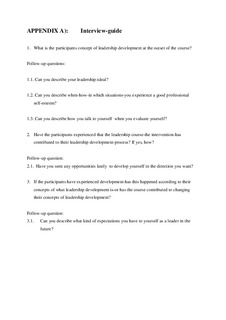| dc.description.abstract | In this thesis a case study is conducted to inquire into whether a targeted intervention; a leadership development program, can contribute to the participants experience of leadership development. The case is a ethical program with a leadership development component conducted from February to December 2011, in The Norwegian Armed Forces Medical Services. In this thesis I only focus on the leadership development component of the program. The program had eight participating leaders. I interviewed four of these through qualitative in-depth interviews.
Through analysis of data from the interviews, there emerged the following categories and subcategories: “Conditions”, “Developmental motivation” and “Change”. In the category “Developmental motivation”, three sub-categories emerged: “Primary source of professional satisfaction and self-esteem”, ”Emotional tone used when assessing oneself” and ”Leadership ideals-expectations/contructs prior to the program”. In the category ”Change”, two subcategories emerged :”Self-awareness/consciousness” and ”Future goals”.
To discuss these categories, I mainly drew on constructive developmental theory by Joiner and Josephs (2007), Kegan and Lahey (2009), Torbert(2004), and Horney (1945). In the leadership development program that constitutes the case in this thesis, we use different types of tools to adress changes that the participants want-not only state the present situation and leave it with that. One tool is the 360 feedback profile, to bring to the surface key opportunities for developmental growth. This focuses on the dimensions that reveal the relationship between internal motivating assumptions and patterns of action. Other central tools we use are the Immunity to change-learning platform in the program as well as individual coaching, to address change by trying to unlock our mental immune system’s grip on our perception so we have an opportunity to see it in action (Kegan et Lahey, 2009). Our aim in the program is to enable a development of a greater awareness and sensitivity to the full range of levels of consciousness available to the participants. We also focus on taking an adaptive approach to adaptive challenges (Heifetz, 1994), as well as enabling the participants to gain consciousness into their reactive patterns (Horney, 1945).
The participants point to the experience of the program being able to provide them with ways of using their everyday experiences for development. I found that the tools we use in the program can enable the participants to experience developmental processes, which the informants describe further. | nb_NO |


